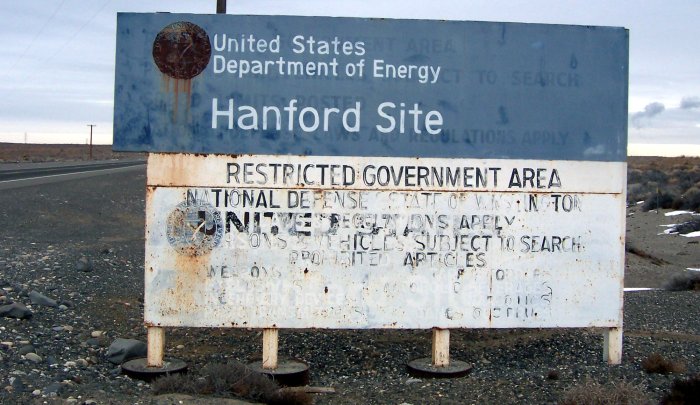With multiple leaks of radioactive waste from underground tanks dating back to the Manhattan Project and a cleanup running far behind schedule, the Hanford Nuclear Reservation is one of America’s most complex environmental challenges.
Planners of a second Trump Administration are embracing a hurry-up solution and setting the stage for possible confrontation with the state of Washington: They are proposing to reclassify high-level nuclear waste to make its treatment cheaper and quicker.
The Heritage Foundation’s controversial Project 2025 maps out a trio of paths forward to “accelerate and innovate” the cleanup. The chief idea is to reclassify the most intensely radioactive stuff found on the 584-square-mile nuclear reservation in Eastern Washington. Hanford Reservation holds 60 percent of the nation’s high-level nuclear waste, and more radioactive waste than all other sites combined.
Project 2025 explains it in language that will not reassure those who worry about leaks from tanks designed for a lifespan of 20 to 25 years and located just seven miles from the Columbia River: “A central challenge at Hanford is the classification of radioactive waste. High-Level Waste (HLW) and Low-Level (LLW) classifications drive the remediation process. Under President Trump, significant changes in waste classification from HLW to LLC enabled significant progress on remediation. Implementation needs to continue across the complex, particularly at Hanford.” This ploy might soon draw legal fire.
The cost of cleanup has already soared from $4 billion to $17 billion, and the overall project is 17 years behind its original schedule. Hanford holds 56 million gallons of radioactive waste in 177 underground tanks — 149 of them single-shell — some of which are leaking. Reclassifying the high level waste would allow the U.S. Department of Energy to turn it into grout and ship it off site, a much cheaper alternative than turning the waste into glass logs. The volume of high level waste in single shell tanks is eye-popping, enough to fill 45 Olympic-sized swimming pools. (An excellent, comprehensive article on the Hanford cleanup by John Stang ran a few days ago on CascadePBS.)
The cleanup has been governed by a 1989 agreement negotiated by then-Department of Ecology director Chris Gregoire with the Bush, Sr. Administration. It gives the state a central role in cleaning up the federal site, which manufactured plutonium for nuclear weapons from World War II through the mid-1980s. It created a three-way partnership of the Department of Energy, the EPA, and the state’s Department of Ecology. The state has successfully gone to court whenever the federal government has sought to cheat on its requirements.
All of which brings us to Gov.-elect Bob Ferguson. As Attorney General, Ferguson has fought the Department of Energy in court, notably over a 2018 Washington law to protect Hanford workers. The case went all the way to the U.S. Supreme Court. Washington lost the case but revised the law.
Ferguson dared the Department of Energy to challenge the state again. “If they do, we will defend these protections all the way back to the Supreme Court again if we have to,” Ferguson said. “As long as I am Attorney General, I will fight for Hanford workers.”
He will soon be Governor, with a government to run, a broad agenda to implement, and a budget to write. Arguably, the job of challenging Trump should be left to other states and other issues. But what if the incoming Trump Administration unilaterally reclassifies high level radioactive waste in its leaky tanks? What if it raids infrastructure projects, such as the Columbia River bridge on Interstate 5, for Hanford cleanup money? What if it barges ahead and disregards the state’s role?
Project 2025 treats the state as an obstacle rather than a partner. “Some states (and contractors) see [nuclear cleanup] as a jobs program and have little interest in accelerating the cleanup,” it states. “The Hanford site in Washington state is a particular challenge. The Tri-Party Agreement among the Department of Energy, the Environmental Protection Agency, and Washington state’s Department of Ecology has hampered attempts to accelerate and innovate the cleanup.”
The nuclear waste site could, and likely will, draw the state of Washington back into battle with President Trump. Meanwhile, some authors of Project 2025 are migrating from the Heritage Foundation into the new administration. They anticipate “significant political and legal challenges with the state of Washington,” but clearly see changing classification of high-level nuclear waste as a way to cut down costs and move up cleanup goals.
Expect the state to have none of it. During an initial reclassification battle five years ago, Gov. Inslee and AG Ferguson fired off a statement reading: “The Trump Administration is showing disdain and disregard for state authority with these actions. Washington will not be sidelined in our efforts to clean up Hanford and protect the Columbia River and the health and safety of our state and our people.”
Gov.-elect Bob Ferguson’s name has been absent from articles on anticipated national resistance by Democratic governors and attorneys general to the second Trump Administration. I don’t expect the omission to last long. Think of Hanford as a chessboard for a ferocious battle over the environment and states rights. Especially as those single-shell tanks keep leaking their deadly contents.
Discover more from Post Alley
Subscribe to get the latest posts sent to your email.

Great piece, Joel. I’m glad you referenced Christine Gregoire’s great work as director of the Washington State Department of Ecology, in negotiating the Tri Party Agreement.